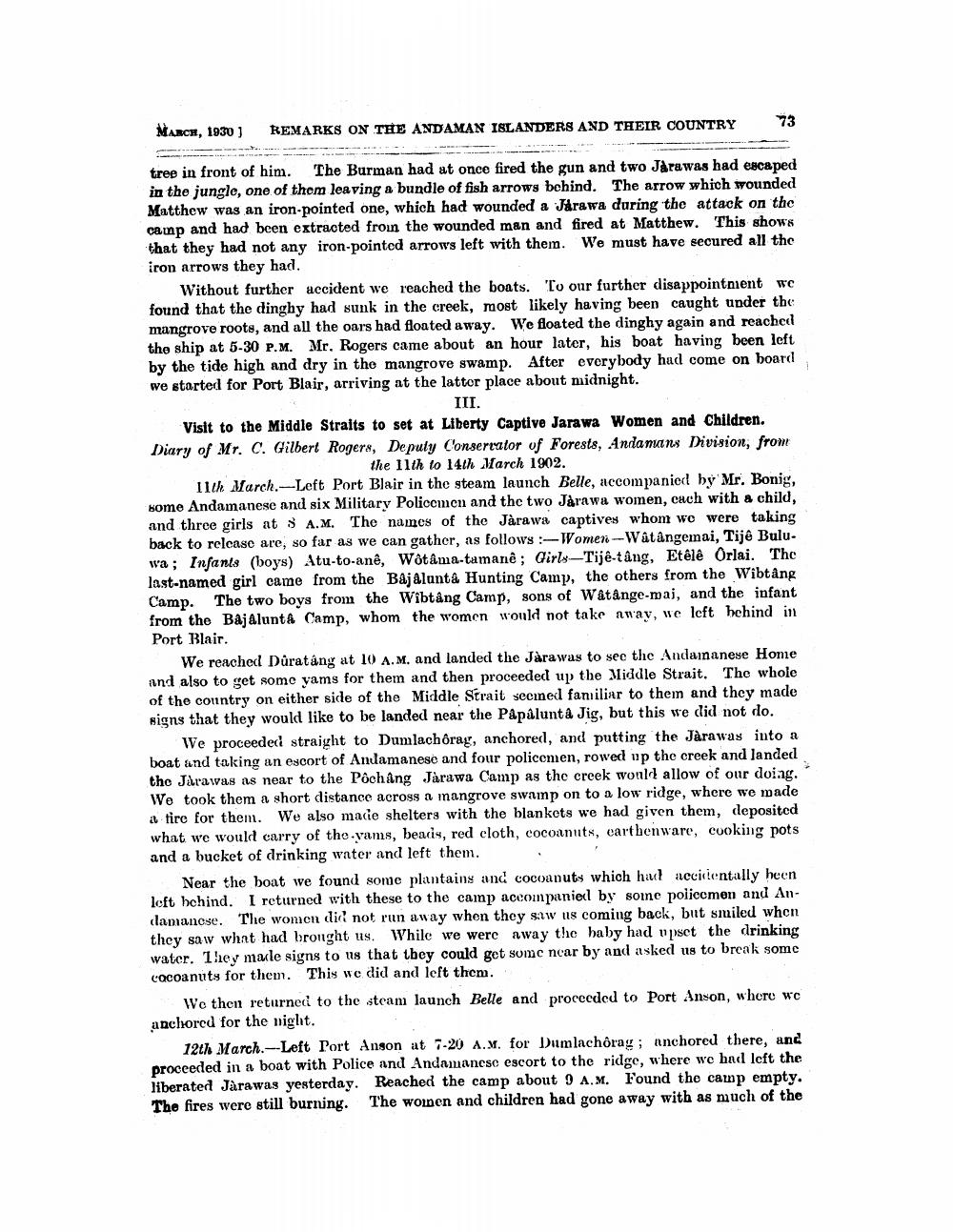________________
MARCH, 1930)
REMARKS ON THE ANDAMAN ISLANDERS AND THEIR COUNTRY
73
tree in front of him. The Burman had at once fired the gun and two Jarawas had escaped in the jungle, one of them leaving a bundle of fish arrows behind. The arrow which wounded Matthew was an iron-pointed one, which had wounded a Járawa during the attack on the camp and had been extracted froin the wounded man and fired at Matthew. This shows that they had not any iron-pointed arrows left with them. We must have secured all the iron arrows they had.
Without further accident we reached the boats. To our further disappointment we found that the dinghy had sunk in the creek, most likely having been caught under the mangrove roots, and all the oars had floated away. We floated the dinghy again and reached the ship at 5-30 P.M. Mr. Rogers came about an hour later, his boat having been left by the tide high and dry in the mangrove swamp. After everybody had come on board we started for Port Blair, arriving at the lattor place about midnight.
III. Visit to the Middle Straits to set at Liberty Captive Jarawa Women and Children. Diary of Mr. C. Gilbert Rogers, Deputy Conservator of Forests, Andanans Division, from
the 11th to 14th March 1902. Ilth March.Left Port Blair in the steam launch Belle, accompanied by Mr. Bonig, some Andamanese and six Military Policemen and the two Jarawa women, cuch with a child, and three girls at 8 A.M. The names of the Jàrawa captives whom we were taking back to release are, so far as we can gather, as follows -Women----Watangemai, Tije Buluwa; Infants (boys) Atu-to-anê, Wótama-tamanê; Girls-Tije-tang, Etêlê Orlai. The last-named girl came from the Bajalanta Hunting Camp, the others from the Wibtâng Camp. The two boys from the Wibtâng Camp, sons of Wåtânge-mai, and the infant from the Bajalunt& Camp, whom the women would not take away, we left hehind in Port Blair.
We reached Duratâng at 10 A.M. and landed the Járawas to see the Andainanese Home and also to get somo yams for them and then proceeded up the Middle Strait. The whole of the country on either side of the Middle Strait secined familiar to them and they made signs that they would like to be landed near the Papalunta Jig, but this we did not do.
We proceeded straight to Dumlachôray, anchored, and putting the Jarawas into a boat and taking an escort of Anlamanese and four policemen, rowed up the creek and landed the Jarawas as near to the Pôchang Jarawa Camp as the creek would allow of our doiag. We took them a short distance across a mangrove swamp on to a low ridge, where we made a fire for them. We also macie shelters with the blankets we had given them, deposited what we would carry of the.vams, bearis, red cloth, cocoanuts, carthenware, cooking pots and a bucket of drinking water and left them. .
Near the boat we found some plantains and cocoanuts which had nocidentally been left hchind. I returned with these to the camp accompaniel by some policemen and Andamanose. The women did not run away when they saw its coming back, but smiled when they saw what had brought us. While we were a way the baby had psct the drinking water. They maile signs to us that they could get some ncar by and asked us to break some Cocoanuts for them. This we did and left them.
We then returned to the steam launch Belle and proceeded to Port Anson, where we anchored for the night.
12th March.---Left Port Angon at 7-20 A.M. for Dumlachôrag; anchored there, and proceeded in a boat with Police and Andamanesc escort to the ridge, where we had left the liberated Jàrawas yesterday. Reached the camp about 9 A.M. Found the camp empty. The fires were still burning. The women and children had gone away with as much of the




